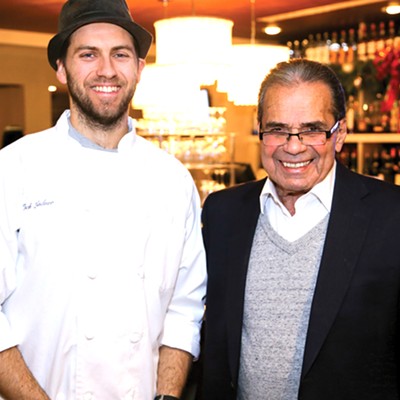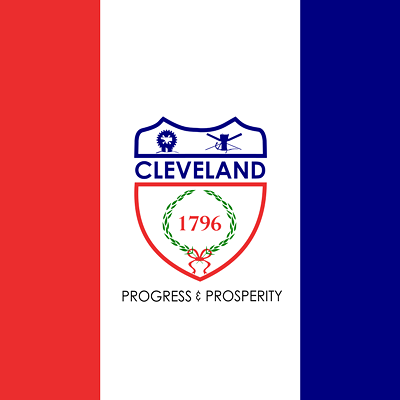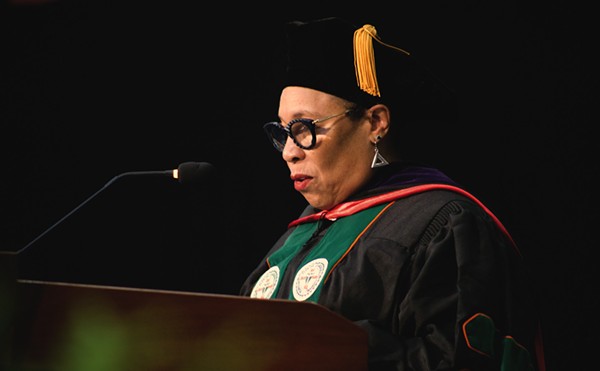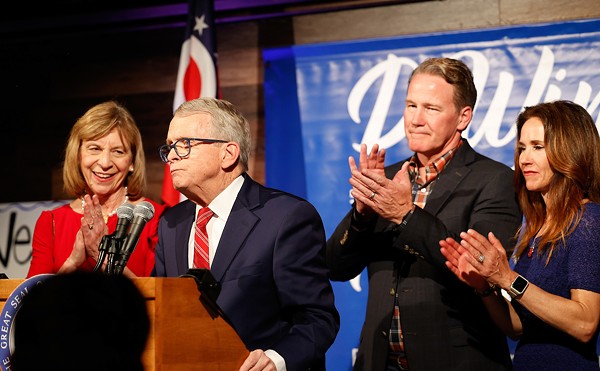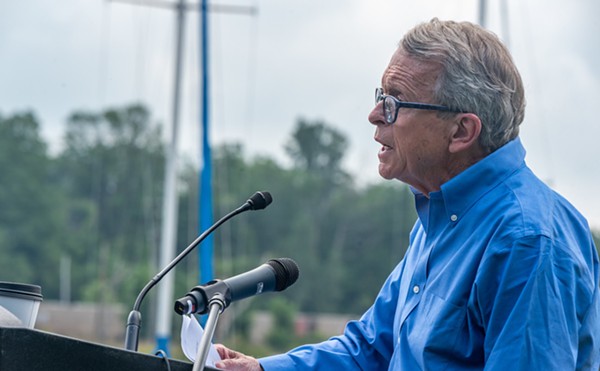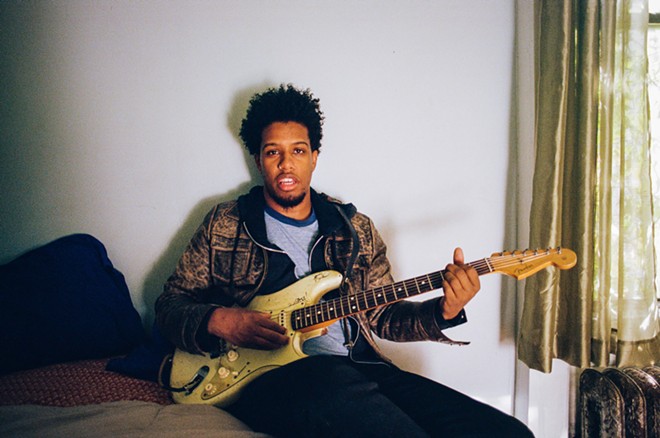
It might be the most surprising, at least to those in his circle, that Jacob Boarman's decision to flee Cleveland for New York is rooted in anger.
Boarman, a 24-year-old musician from the west side, has fashioned a friend-to-all persona in his past eight years of gigging, just as much as he has a head-down, laboring guitarist. Known to show up to gigs in black leather bodysuits or jean coveralls, Boarman performs his upbeat guitar pop with a kind-guy smile, full of appreciation. "I don't want to be a burden of you," he sings in a recent single. "Just give me a chance."
Yet, in March, a month after producing "Burden of You," Boarman gave up on Cleveland's scene. He and his colleagues at Impossible Art, a gallery he booked shows for in Ohio City's Hingetown, had enough.
By the end of September, he would relocate to New York.
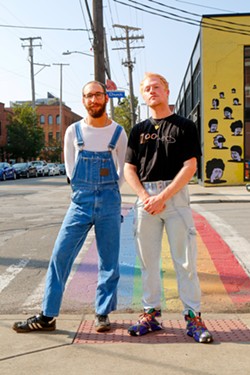
"We put so much effort towards putting those shows on," Boarman said recently outside a coffee shop in Hingetown, wearing Sambas and light-blue coveralls. "It showed me that I personally, right now, can't make money as a communal thing, or money off my music in this community, and still focus on music."
The faraway lure of the oft-noted Music Cities—Austin, Nashville, New York, Seattle—has long been been a thorn in the side of Cleveland industry heads striving to prevent brain drain. Today, with independent venues nearing a full post-pandemic rebound, outside resources are being eyed for assistance in keeping local talent local. And paying them a fair wage.
And the apogee of that wishlist seems to be in the form of a Cleveland Music Commission. Just like Nashville's Music, Film and Entertainment Commission, or Austin's Music Commission, a similarly-structured body here in Cleveland, potential backers say, could replicate fruits seen in other cities. Namely by giving gigging artists and indie venues true political credence, and financial help, from City Hall.
"At its core, we want to make music sustainable, performance sustainable for the people involved," Sean Watterson, the owner of the Happy Dog, told Scene. "And that's the venues, the promoters and the performers."
Watterson, along with the Beachland's Cindy Barber and the Grog Shop's Kathy Blackman, is part head of the Commission's proto form, the Cleveland Music Club Coalition. Springing to life in 2010 to fight to lower the city's 8% admissions tax on venues, the Coalition morphed into a Zoom-based roundtable for the who's who of the non-corporate circuit. (It succeeded in lowering the tax.)
How, the Coalition asks frequently, should Cleveland actualize its Birthplace of Rock label and regain some of the luster it seems to have lost in the past five, six decades?
This summer, following Mayor Justin Bibb's appointment of Rhonda Brown as Cleveland's first arts czar, the coalition made its bullet point wishlist: Create an online directory of "what already exists," every venue, artist, promoter, et cetera; fund an exhaustive one-stop calendar of "every single" music event in the city (like DC Music Live); and ensure Cleveland's reality meets the expectations of incoming tourists and locals. (Mostly by hiring more local bands.)
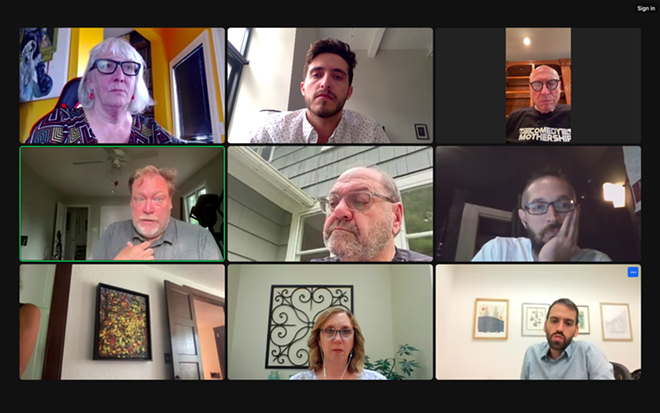
The conversation seems to be bifurcated, in a way: Bigger venues, the Live Nation-backed behemoths, the FieldHouses and Agoras, appear to have more cultural precedence than the clubs that bolster artists in nearby zip codes. A commission, they said, especially with a city budget, could redirect that spotlight.
"We're the street vendors," Nick Kostis, the owner of Pickwick and Frolic, said in the call. "Whereas the higher profile arts and cultural offerings that visit our city, or that are somehow presented in our city, seem to hold a status that is above and beyond."

"The problem here is audience development," Cindy Barber said. It's why she founded Cleveland Rocks Shop in 2012: as a "past, present, future" epicenter for local music, a sort of grassroots Rock Hall. "Sure, we have venues that play local bands. But oftentimes those shows are, like, half full or less than half full for those bands."
As for refitting tourist havens—Flats East Bank, East 4th—to be more comfy for up-and-comers, Kathy Blackman scoffed.
"Cleveland is not Nashville!" she said. "We're just a different city. Our venues are all spread out." Blackman brings to mind Nashville's Broadway Ave., the dense street with Vegas implications, now populated with bro country and bachelorette caravans. "I don't think it makes any sense to try to reinvent the entertainment district and negate what we've all built."
If the demands of the coalition seemed to be reverberated from a past era, it may because they kind of are.
In 2011, Cleveland State's Center for Economic Development published the Remix Report, a 222-page, in-depth examination of Cleveland's music industry, with a secondary goal of determining how to best direct it.
Surveying over 900 musicians and industry professionals, the research team determined that the cons of Cleveland's scene imitated the faults of its design: the industry was "scattered," "disjointed," and "lacked unification." Musicians interviewed "believed that, while the region is filled with talented individuals," the report reads, "they are not organized or united in a meaningful way, and face challenges in connecting with others.”
Moreover, as Watterson and Barber may talk about today, necessary resources to foster work as a professional were scarce, or hard to reach. Artists, just as they do today, wanted links to agents. They needed help crafting electronic press kits. They wanted "booking agencies, investment capital firms, entertainment lawyers"—and a unified body to aid them in the search process. (And, yes, a Music Czar to help bankroll their albums. And a "comprehensive website.")
As for leaning into the Rock and Roll City perception, the report was a bit skeptical.
“Many people feel Cleveland needs to be (re)branded as a Music City to be counted with the likes of Austin, Memphis, Nashville, and Portland," the report reads. "However, merely launching an expensive branding campaign that has little impact on the way people experience a place will fail quickly."
Instead, Remix hinted at politics. The scene, the authors determined, "should unite around a common goal or cause and strategic vision for its future.”
For Braxton Taylor, 29, the "stifling" reality of Cleveland's club scene had stymied his creativity come last October. Taylor had played guitar and sang for years with soul-rock outfit SamFox until going solo, under the moniker Smith Taylor, in 2019. In late 2022, while hosting routine jams at The Hodge on St. Clair Ave., and "broke as shit," Taylor lost interest in climbing the venue hierarchy.
"I felt I wasn’t going to be able to sustain myself much longer unless I settled and compromised," Taylor said in a phone call. "If I could do this here, I could do this anywhere. Why not do it in an international city?"
He moved to Brooklyn late last year, mostly to surround himself with "more like minds." "In Cleveland, you're a big fish in a small pond," Taylor said. "Go, leave, come here—now you’re a small fish in a fucking ocean."
In early August, a week after Boarman's final Cleveland show for now, at BLK Punk Press in Midtown, he and his friend Andy Schumann meet Scene for coffee in Hingetown, a block south of Impossible Art. It's clear just minutes in that Schumann, 26, who works in labor rights and books bands for Sofar Sounds, backs Boarman's choice to relocate from a wholly economical standpoint. "I almost turned down the job," Schumann said about his Sofar gig. "They were offering bands $100. I mean, that sucks."
But are rent hells like Nashville and New York, which average upwards of $1,787 and $3,250 respectively, equate the worth of their perceived creative utopias?
For now, Boarman is unwavering. He nods towards NYC Noise, a show aggregator that could rival Washington, D.C.'s, or act as a fitting lodestar for the object of the possible Cleveland Music Commission.
"They're getting publicized, and people are going to the show because there's a community for it, and it's getting broadcast and it's getting shown," Boarman said. "So that's why I'm going there. I want to see the community."
Subscribe to Cleveland Scene newsletters.
Follow us: Apple News | Google News | NewsBreak | Reddit | Instagram | Facebook | Twitter | Or sign up for our RSS Feed


